
Port-au-Prince, Haiti : working and living in chaos?
Romain Le Cour Grandmaison, Arnaud Dandoy & Sarah Chateau
The conference will be held at MSF headquarters, 34 avenue Jean Jaurès, 75019 Paris. The conference will be broadcast live in English on this page and in French here. For anyone outside MSF, registration is required to attend the conference in person. You will find the registration form below.
The Crash team is pleased to invite you to a conference-round table on Thursday February 6 at 6:30pm, with researchers Romain Le Cour Grandmaison and Arnaud Dandoy, and Sarah Chateau (MSF).
Year after year, the situation in Haiti is described with the same words: “dramatic”, “worsening”, again and again. The grip of gangs on Port-au-Prince is now almost complete. In these areas, massive kidnappings, extortion, sexual violence, attacks, and violent confrontations with the police and citizen self-defense groups—often resulting in atrocities on both sides—are daily occurrences. Insecurity, which has become the norm, permeates every aspect of social life.
Against all odds, MSF has managed to maintain its operations in the Tabarre neighborhood and the Cité Soleil slum over the years, despite widespread turmoil and violence. This has been possible thanks to extensive networking and negotiations with various stakeholders, including gangs. Working with gangs and treating their wounded has earned MSF a degree of goodwill from them, but the greatest dangers we face today come from elsewhere. In November 2024, for instance, the grave incidents—execution of patients and threats against staff—that led to the suspension of MSF’s activities were perpetrated by police brigades and self-defense groups.
While MSF’s activities are resuming with caution, this conference will attempt to shed light on some facets of this context. After describing the recurring problems faced by MSF projects in this “ecosystem of violence”, we'll look at the actors involved - armed groups, police, self-defence brigades - their logic and motivations, the way they operate, their violent practices, how they evolve, and the possible circulation between them.
Romain Le Cour Grandmaison is director of the Haiti program at the non-governmental organization Global Initiative (GI-TOC). He also holds a doctorate in political science from the Université Paris-1 Panthéon-Sorbonne.
Arnaud Dandoy is co-director of the Center for Research and Exchange on Security and Justice (CRESEJ), and currently in charge of research and knowledge management at Avocats sans frontières. He holds a doctorate in criminology from the University of Kent, UK.
Sarah Chateau is MSF's program manager for Haiti.
To cite this content :
Romain Le Cour Grandmaison, Arnaud Dandoy, Sarah Chateau, “Port-au-Prince, Haiti : working and living in chaos?”, 6 février 2025, URL : https://msf-crash.org/en/conferences-debates/port-au-prince-haiti-working-and-living-chaos
If you would like to comment on this article, you can find us on social media or contact us here:
Contribute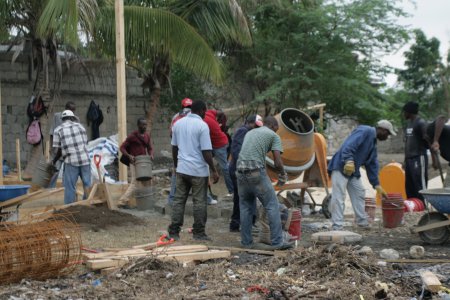 Karel Marsalek
Opinion
Karel Marsalek
Opinion
Reconstruction : priorité aux choix des Haïtiens
03/16/2010 Rony BraumanDans cette chronique d'Alternatives Internationales, Rony Brauman souligne que le séisme de Port-au-Prince de janvier 2010 est d'une ampleur sans précédent et qu'en dépit de la confusion initiale des secours, ceux-ci ont été bien orientés. Il estime que, quelle que soit la défaillance de l'Etat haïtien, c'est d'Haïti que devra être conduite la reconstruction.
 Eliza Currando
Op-ed
Eliza Currando
Op-ed
Faiblesses du dispositif anti-choléra à Haïti
11/23/2010 Rony BraumanL'épidémie de choléra qui sévit depuis près d'un mois à Haïti met en évidence la faiblesse du dispositif international de réponse à des épisodes aigus de ce type. Les violences dirigées contre les soldats de la Minustah, accusés par la rumeur publique d'être les vecteurs de cette maladie infectieuse, nous rappellent que les épidémies attisent les peurs.
Haiti Earthquake: What Priorities?
01/20/2010 Rony BraumanThe earthquake that devastated Port-au-Prince and neighboring areas has led to a worldwide surge of solidarity which we must fully appreciate because no country could face such a disaster on this scale alone.
Past events
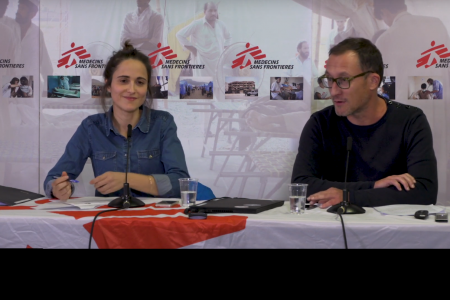 Conference
Conference
Motivations for mass violence: different interpretations
10/03/2019 - 06:00 PM 08:00 PM Nicolas MariotConference – debate, Thursday, 3 October 2019, 6-8pm, 1st floor meeting room at MSF, 8 rue Saint Sabin. Streaming and simultaneous translation into English available.
What turns ordinary men into killers? The CRASH team invited you to a conference – debate with the sociologist and historian, Nicolas Mariot, author of an article entitled « Faut-il être motivé pour tuer? Sur quelques explications aux violences de guerre » (Genèses, n°53, 2003, p. 154-177) and books such as “Face à la persécution. 991 Juifs dans la guerre" (with Claire Zalc, Paris, Odile Jacob, 2010), “Tous unis dans la tranchée ? 1914-1918, les intellectuels rencontrent le peuple" (Paris, Seuil, 2013). Nicolas Mariot presented two different interpretations of motivations for mass violence in the 20th century, drawn from a series of studies and surveys on the subject.
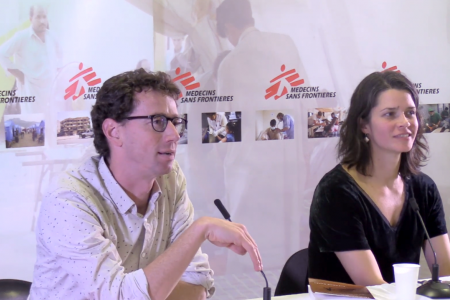 Conference
Conference
Third-Worldism and Sans-Frontiérisme 1954-1988
04/11/2019 - 06:30 PM 08:30 PM Eleanor DaveyEleanor Davey, historian of ideas and humanitarianism, senior lecturer at the Humanitarian and Conflict Research Institute, University of Manchester, discusses her book, Idealism Beyond Borders. The French Revolutionary Left and the Rise of Humanitarianism, 1954-1988, devoted to the intellectual history of sans-frontiérisme and Third-Worldism, in France, from the Algerian war to the early years of Médecins Sans Frontières.
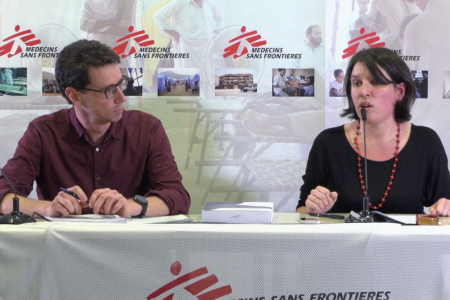 Conference
Conference
Healing foreigners in France: The State and the civil society organisations from the 80s to the 90s
12/17/2018 - 06:00 PM 08:00 PM Caroline IzambertThe CRASH team invited you to the debate-conference “Healing foreigners in France: The State and the civil society organisations from the 80s to the 90s” on Monday 17th of December 2018 from 6 to 8pm, in the 1rst floor room at the 8 rue Saint-Sabin. We hosted Caroline Izambert, who recently defended, at the EHESS, her PhD thesis focusing on the foreigners’ access to healthcare in France. Her title: “Heal foreigners?” The State and the civil society organisations for the health coverage of the poor and foreigners in France from the 1980s to the present day.
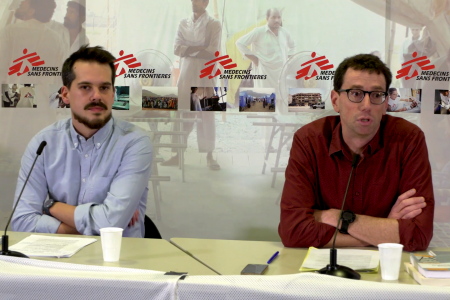 Conference
Conference
Borders and Hospitality
11/26/2018 - 06:00 PM 08:00 PM Benjamin BoudouConference/debate with Benjamin Boudou, political scientist and researcher at the Max Planck institute.
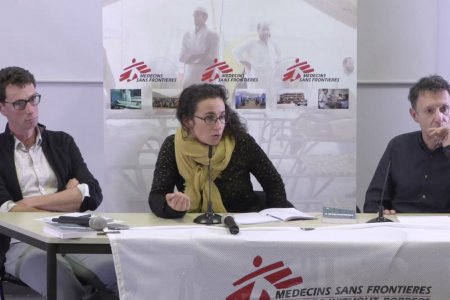 MSF-Crash
Conference
MSF-Crash
Conference
Immunization: new perspectives on vaccines - Conference with Lise Barnéoud
12/05/2017 - 06:00 PM 08:00 PM Lise BarnéoudWho profits from vaccination? Individuals? Society? Companies? Is vaccination efficient? Is it dangerous? Profitable? What are the factors influencing public opinion in this domain? Lise Barnéoud, science journalist and author of Immunisés ? Un nouveau regard sur les vaccins, has engaged in an investigation revealing multiple - and sometimes contradictory - realities observed in the French vaccination sector. She has carried out her investigation from three distinct viewpoints: the one of a mother who needs to decide whether to vaccinate her children or not; of a journalist leading an enquiry; and of a scientist analyzing how facts are built.
Lise Barnéoud was a Crash guest speaker at a conference on vaccination held on December 5, 2017. A discussion with Epicentre, Crash and the MSF Medical Department allowed us to exchange views on vaccinal policy, which remains a cornerstone of MSF operations and a recurring subject of discussion and controversy.
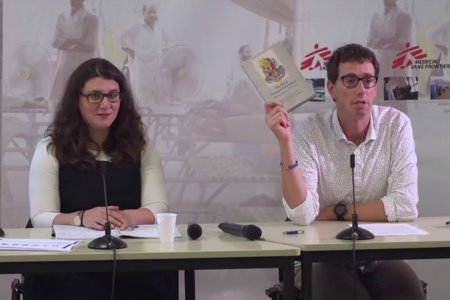 MSF
Conference
MSF
Conference
Humanitarian anthropology : conference with Sharon Abramowitz
10/23/2017 - 06:00 PM 08:00 PM Sharon AbramowitzSharon Abramowitz is an anthropologist and a visiting researcher at the Department of Anthropology at Rutgers University, co-editor of recently published Medical humanitarianism. Ethnographies of practice. She has devoted much of her work to responding to epidemics - most recently in Ebola, and in West Africa, Liberia in particular.
During the conference organized by MSF-Crash on 23 October 2017, she discussed the contribution of medical anthropology to humanitarian action as well as her latest book and most recent projects.
Période
Newsletter
Subscribe to our newsletter to stay informed about our latest publications. Interested in a specific author or thematic? Subscribe to our email alerts.
